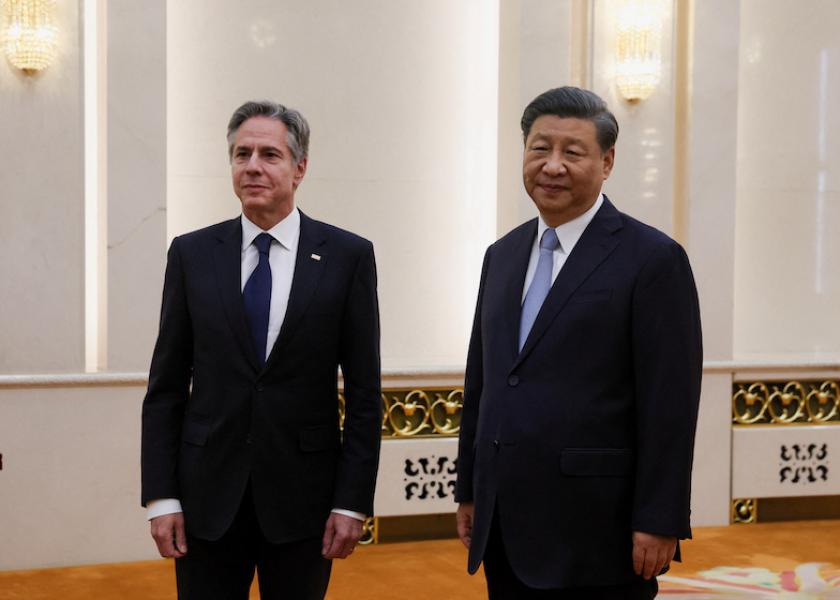U.S. and China Relationship Status: It's Still Complicated

The U.S. and China have reportedly made “progress” and agreed to stabilize their relationship, but no major breakthroughs or a path to resolve ongoing issues were outlined at the end of the meeting between Secretary of State Anthony Blinken and Chinese President Xi Jinping.
The two met to try to repair deteriorating ties between Washington and Beijing and maintain open lines of communication. The visit, the first by a senior U.S. official since President Biden took office, follows lower-level engagements and ongoing hostilities.
Speaking at U.S. Embassy in Beijing after the two-days of meetings, Blinken said all his meetings with top officials in China were constructive and reiterated that competition between the U.S. China should not “veer into conflict.”
Ahead of the trip, officials said Blinken would discuss the importance of responsibly managing the U.S./China relationship, address bilateral issues of concern, and explore potential cooperation on global challenges.
There was also a lot of focus on Taiwan. During the meetings, Blinken said the U.S. held a “One China” policy and does not support Taiwanese independence, but is concerned about China’s “provocative actions” along the Taiwan Strait.
Blinken also told Chinese officials the U.S. wasn't trying to contain China's economic growth, but instead protect technologies critical to national security.
Meanwhile, top diplomat Wang Yi said Monday Washington’s “erroneous perception” of China was the reason for the deteriorating relationship between the two countries. Wang also said Taiwan remained a sovereign part of China and that no compromise was an option on the issue.
The Chinese leader also told the U.S. to not assume that China was seeking dominance. During a three-hour meeting between the two, Wang reportedly told the Biden administration to not “misjudge” Beijing based on trajectories of traditional Western powers.
“This is key as to whether the U.S. policy towards China can truly return to objectivity and rationality," said Wang.
Conflict between the two countries has been rising, and not every aspect of ongoing tensions was resolved. Reuters also reported China refused to entertain Washington's bid to resume military-to-military communication channels and cited U.S. sanctions as the obstacle.
According to Farm Journal Washington Correspondent Jim Wiesemeyer, senior U.S. officials didn’t expect significant breakthroughs ahead of Blinken’s trip, but aimed to restore a sense of calm and normalcy to high-level contacts. The trip took place amid escalating concerns about trade, industrial espionage, human rights and more.
Blinken's original trip scheduled for February was postponed after a suspected Chinese spy balloon flew across the U.S. The two-day trip to Beijing by Blinken marked the first by a U.S. secretary of state in nearly five years.
What Happened to Those Spy Balloons?
According to President Biden, the "Chinese spy balloon" that flew over the U.S. in early April was an accident.
Wiesemeyer reporting on comments recently made by Biden. The president saying President Xi Jinping never meant to fly a spy balloon over sensitive American military sites earlier this year. “I don’t think the leadership knew where it was, and knew what was in it, and knew what was going on,” Biden told reporters Saturday as he headed to Philadelphia for his first campaign rally of the 2024 election. “I think it was more embarrassing than it was intentional.”
“I’m hoping that over the next several months I’ll be meeting with Xi again, and talking about legitimate differences we have but also how … to get along,” Biden added.
Other Economic Events in China
Wiesemeyer says Microsoft co-founder Bill Gates recently met with Chinese President Xi Jinping in Beijing, shortly after a visit to the city by Tesla CEO Elon Musk. During their meeting, Xi expressed his delight in seeing Gates, referring to him as an "old friend" and acknowledging their hiatus caused by the pandemic.
Xi emphasized that the foundation of Sino-U.S. relations lies in the people and, given the current global climate, proposed engaging in various activities to benefit both countries and humanity. Gates replied by stating he was "very honored" to have the opportunity to meet with Xi.
As China continues to make headlines, Wiesemeyer also says China's economy remains in focus. China’s weaker-than-expected data for May spurred economists at several banks to recently lower their growth forecasts for the year. JPMorgan, UBS and StanChart all trimmed their GDP growth forecasts to 5.5% or lower. Expectations are growing that China will boost spending, especially on infrastructure, as part of a broader stimulus push.
To strengthen its economy, China is planning major spending initiatives that may involve investing billions of dollars in infrastructure and relaxing regulations for property investors, the Wall Street Journal reports.
Wiesemeyer reports these measures are in addition to the People's Bank of China's interest rate cuts and signify growing concerns over the economy's future after the excitement of relaxed Covid-19 restrictions has faded. The steps could involve issuing approximately 1 trillion yuan ($140 billion) in special treasury bonds to assist local governments and boost business confidence.
These bonds would be utilized in infrastructure projects and other activities aimed at fostering economic growth, while also helping local governments repay their debts. Additionally, officials are considering lifting purchase restrictions on second homes in smaller cities to support the property market. However, there is skepticism over whether the efforts will result in the desired economic boost, given recent indicators that the economy is struggling.
To support rural areas of China, the People's Bank of China has announced around 30 measures aimed at aiding the agricultural sector. Some of these measures include financing for major grain producers to expand capacity and upgrade equipment and technology.
The central bank's plan requests financial institutions to issue medium- and long-term loans, which will be used for upgrading agricultural facilities and supporting the seed industry. Furthermore, the plan highlights the importance of ensuring grain production and supply. The statement reveals that re-lending and rediscount facilities will also be utilized to help financial institutions in this endeavor.
Syngenta Wins Shanghai Stock Exchange’s Approval for IPO
Also of importance to agriculture, Syngenta received the nod to launch $9.1 billion Shanghai IPO, anchoring the world’s biggest stock sale this year in China’s commercial hub. The Shanghai Stock Exchange has approved the $9.1 billion IPO of Syngenta Group, taking the Swiss agricultural giant a step closer to completing what could possibly be the world’s largest offering this year.







